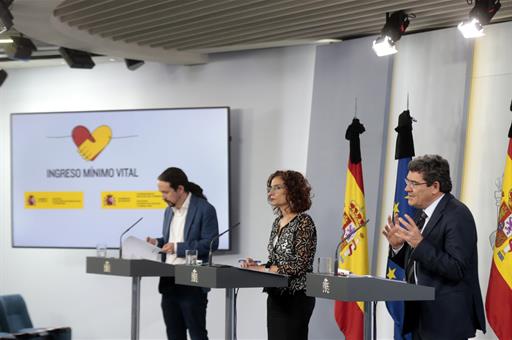Extraordinary Council of Ministers. Coronavirus COVID-19
Government approves Minimum Living Income
Council of Ministers - 2020.5.29
Moncloa Palace, Madrid
The Council of Ministers approved a Royal Decree-Law introducing the Minimum Living Income, a non-contributory benefit under the social security system that guarantees a minimum income for those in need of one.
The Minister for the Treasury and Government Spokesperson, María Jesús Montero, recalled that the measure is contained in the agreement signed between the political formations that make up the government and in the investiture speech of the President of the Government.
María Jesús Montero claimed that the intense economic and social crisis caused by COVID-19 has led to its early introduction. "We are well aware that the pocket of poverty we had identified before the outbreak of the pandemic has become larger as a result of the new difficulties that thousands of families are facing".
María Jesús Montero recalled that the government has approved plans to protect jobs and prevent evictions and utilities being cut off, but, in order to leave no-one behind, it is creating this new right for citizens to fight extreme poverty, above all when involving children.
New social right
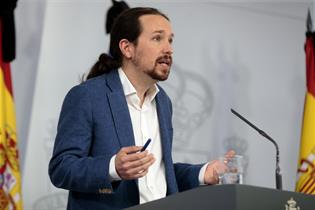 Pool Moncloa/JM CuadradoThe Second Vice-President of the Government and Minister for Social Rights and 2030 Agenda, Pablo Iglesias, highlighted that the Minimum Living Income is the greatest breakthrough in social rights since the approval of the 2006 Long-term Care Act.
Pool Moncloa/JM CuadradoThe Second Vice-President of the Government and Minister for Social Rights and 2030 Agenda, Pablo Iglesias, highlighted that the Minimum Living Income is the greatest breakthrough in social rights since the approval of the 2006 Long-term Care Act.
Pablo Iglesias explained that citizens will receive this provided that they meet the requirements, as with retirement pensions and unemployment benefits.
The guaranteed income threshold will be 462 euros a month for an adult living alone. In the case of multiple occupation, specified the Second Vice-President of the Government, this will increase by 139 euros a month per person, up to a maximum of 1,015 euros. Single-parent families will also receive a supplementary benefit of 100 euros a month.
The benefit is calculated as the difference between the monthly income of the individual or cohabiting unit and the guaranteed income in each case.
Pablo Iglesias underlined that those applying for the Minimum Living Income, should they meet the requirements, can combine this with income from work while this does not exceed the threshold established. "This is not only designed for the unemployed, but also for those people or households on very low incomes or with very insecure temporary jobs", who will see the coverage of their benefit increased, he specified.
Requirements
The Second Vice-President of the Government stated that all those people aged between 23 and 65 may apply for the benefit, or from 18 if the applicant has minors in their care and has been legally resident in Spain for a minimum period of one year. Access to this benefit will depend on the level of income and assets of the applicant.
As well as income, checks will be made as to the net equity of the applicant, deducting their debts, but without taking into account their primary residence. The limit on net equity increases according to the number of people in the dwelling. This stands at 16,614 euros for someone who lives alone, and will increase for each family member up to a maximum of 43,196 euros.
Applications can be made as from 15 June, but all applications processed from then until 15 September will be backdated to 1 June.
Pablo Iglesias also highlighted that the Minimum Living Income is a benefit that is compatible with other forms of insertion income from regional governments. "Today we establish a standard minimum income throughout Spain, but regional governments may supplement this according to their specific realities".
Pablo Iglesias reiterated that the income approved on Friday is a social justice measure, because it amounts to the redistribution of wealth, and of economic efficiency, since resources go directly to needy households and to consumption, allowing companies and the self-employed to continue invoicing, which is necessary for the economic recovery.
In his opinion, this income is also a question of security, because people must have a minimum level of material security that allows them to satisfy their basic needs, and a question of liberty, because "there can be no liberty if someone has to invest all their energy in survival".
Social inclusion and integration of beneficiaries
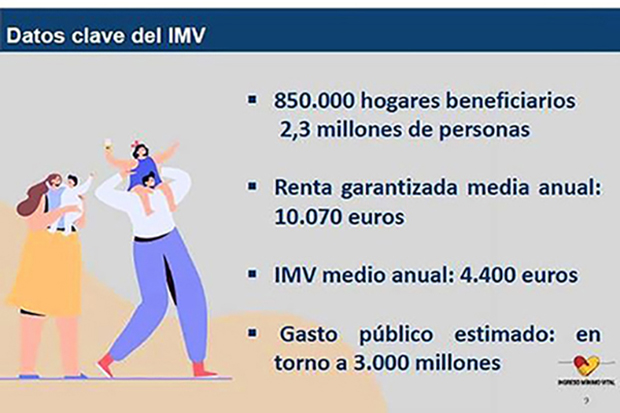
The Minister for Inclusion, Social Security and Migration, José Luis Escrivá, estimates that the Minimum Living Income will amount to an annual public investment of close to 3 billion euros, which is in line with the European average for similar benefits. It is expected to benefit some 850,000 households in total and 2.3 million people, of which 1 million are currently suffering from extreme poverty (with income of less than 3,000 euros a year) while 550,000 have very high levels of poverty (with income from 3,000 to 4,300 euros a year).
The minister pointed out that, in addition to this "extraordinary" impact on reducing poverty among those on very low incomes, this benefit seeks to enhance their social inclusion and integration. "This will be the ultimate success, for these people to better operate in society".
To this end, inclusion strategies will be developed in cooperation and collaboration with regional authorities, which have jurisdiction over this matter, and also with local authorities.
Furthermore, it is fundamental to foster their participation in the labour market, and hence companies will receive incentives for hiring beneficiaries, while the latter may combine this with receiving a salary under the conditions established.
Easy to process and continuous assessment
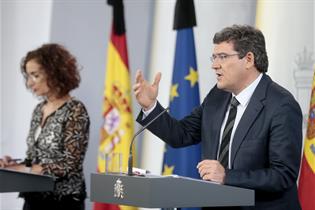 Pool Moncloa/JM CuadradoJosé Luis Escrivá stated that access to the electronic office of the social security system to make an application for the minimum living income is "user-friendly" and will include a simulator to easily verify the right to the benefit, a virtual assistant and a free 900 hotline for information and assistance.
Pool Moncloa/JM CuadradoJosé Luis Escrivá stated that access to the electronic office of the social security system to make an application for the minimum living income is "user-friendly" and will include a simulator to easily verify the right to the benefit, a virtual assistant and a free 900 hotline for information and assistance.
However, he added, thanks to the ability to cross-check data between the tax agency, the social security system and the regional authorities, many beneficiary households have already been identified ex officio, he stressed, "which can start to receive this monthly income".
The minister pointed out that this analysis of households by income and assets has been fundamental to make an assessment "to ensure the benefit is fairer". He also underlined the cooperation between all tiers of government - Central Government, the regional governments and local authorities - and stated that the evaluation of the benefit will continue down the same path "so that everyone that has something to add can provide us with information to improve the system".
In this regard, he announced that an annual report will be issued by the Independent Fiscal Responsibility Authority (Spanish acronym: (AIReF), and a Monitoring Committee will be set up between authorities, together with an Advisory Council, with the participation of trade unions and third sector organisations.
Candidature for new headquarters of European Centre for Weather Forecasts
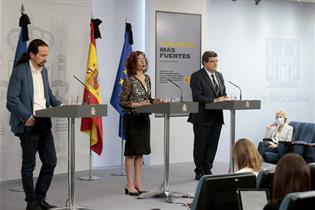 Pool Moncloa/JM CuadradoThe Council of Ministers agreed to propose Spain as a candidate country to host the new headquarters of the European Centre for Medium-Range Weather Forecasts (ECMWF). This inter-governmental organisation, made up of 34 Member States and associate countries, has a single global weather and climate model, recognised as providing the best forecasts in the world.
Pool Moncloa/JM CuadradoThe Council of Ministers agreed to propose Spain as a candidate country to host the new headquarters of the European Centre for Medium-Range Weather Forecasts (ECMWF). This inter-governmental organisation, made up of 34 Member States and associate countries, has a single global weather and climate model, recognised as providing the best forecasts in the world.
The Government Spokesperson explained that these headquarters would coordinate with another two, located in the United Kingdom and Italy, and would initially house 150 people. María Jesús Montero claimed that, thanks to "its productive, human and technological capital", our country is in a good position to compete with other countries to be successful in its bid.
Non official translation





